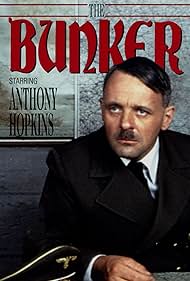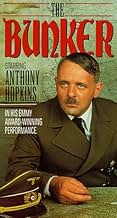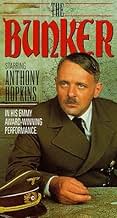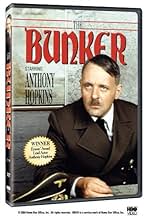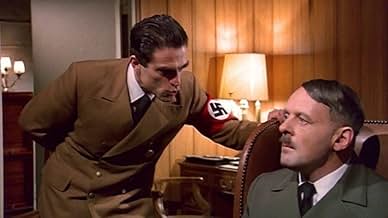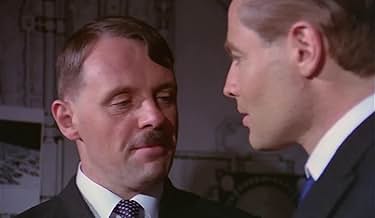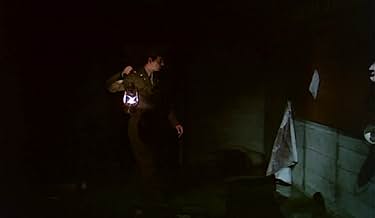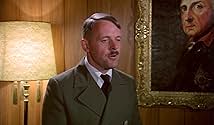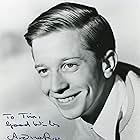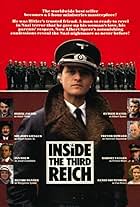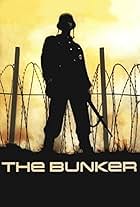The Bunker
- Película de TV
- 1981
- 2h 30min
Agrega una trama en tu idiomaDramatization depicting the events surrounding Adolf Hitler's (Sir Anthony Hopkins) last weeks in and around his underground bunker in Berlin before and during the battle for the city.Dramatization depicting the events surrounding Adolf Hitler's (Sir Anthony Hopkins) last weeks in and around his underground bunker in Berlin before and during the battle for the city.Dramatization depicting the events surrounding Adolf Hitler's (Sir Anthony Hopkins) last weeks in and around his underground bunker in Berlin before and during the battle for the city.
- Dirección
- Guionistas
- Elenco
- Ganó 1 premio Primetime Emmy
- 1 premio ganado y 2 nominaciones en total
- Gard SS #1
- (as George Chorafas)
- Dirección
- Guionistas
- Todo el elenco y el equipo
- Producción, taquilla y más en IMDbPro
Opiniones destacadas
Of most interest are the various performances and the manner in which the various personalities are portrayed. Anthony Hopkins' work as Adolf Hitler was very good - especially considering the difficulties involved in playing such a complex and controversial subject. I thought Hopkins nailed the emotional complexity of the man - deliberately hiding himself from the realities of the War, calmly sitting down to tea with his secretaries one minute, then launching into a deranged tirade against his generals the next, addicted to drugs administered by his personal physician. Those who did makeup for this also got Hopkins to look the part - well not perfectly, but pretty close. Where I thought Hopkins missed the mark a bit was in Hitler's physical state. Aside from some trembling, Hopkins' Hitler actually looked pretty healthy. Other actors have to be looked at as well though, because this movie isn't really about Hitler - it has more to do with how the various personalities involved interacted with Hitler.
Much of the movie revolved around Nazi architect Albert Speer. Richard Jordan handled the part well, although the portrayal of Speer was interesting - probably unavoidably so, since Speer was almost as complex a character as Hitler. In the movie, Speer comes across as basically a good guy, fighting against Hitler's insane plans. There's truth to that view, but it's too limited. Speer was a devoted disciple of Hitler, and his actions against Hitler began only when it became obvious that Germany would lose the war. For Speer, as long as Germany might win, the horrors of Nazism seemed acceptable. Something was lacking in Cliff Gorman's portrayal of Joseph Goebbels. A lot was right - the portrayal of Goebbels' fanatical devotion to Hitler and Nazism, his rabid anti-semitism and his cold as ice attitude - to the point of killing his own family without a second thought simply because he felt that without Hitler, there was no reason for any of them to live. Still, something about Gorman as Goebbels didn't work for me. He just didn't look the part, and I could never really equate the voice with Goebbels either. The third figure of significance was Martin Bormann, portrayed by Michael Lonsdale. Lonsdale was good here. Bormann was a rather shadowy character, and Lonsdale portrayed him that way. You could never really be sure what Bormann's priority was here - getting out of the bunker or staying loyal to Hitler. In fact, that's accurate, because above everything else, Bormann's main preoccupation was with power - whether represented by Hitler or someone else.
Largely missing from this account of these last days in the bunker (although it does pop up in the end) is the rather morbid and completely unreal question of who would succeed Hitler - as if there was going to be anything to succeed to. As I understand it, that was a rather serious issue in the bunker in those last days and weeks; it gets largely passed over in this movie. Basically, however, this is very well done. I particularly liked the last scene, when the machinist Hentschel (Martin Jarvis) throws papers in disgust at the radio when it announces Hitler's heroic death, "fighting to the last breath against Bolshevism," when Hentschel knew full well that Hitler had cowardly committed suicide and left everyone else to fend for themselves. Overall, I give this a 7/10
But just little thing, about characterizations of Adolf Hitler all over the years.
I you closely Watch footage film showing the dictator, the real one, you'll notice that his hair - at least in the last years of his life - did not fall on his forehead, the left side. It was ONLY in the early years, during his rise to power. And curiously, in all films - I must admit although that I don't exactly remember the Bruno Ganz portray - Hitler is shown with his hair falling on the left side of his forehead. I have always wondered why... And I guess I found out. It's only a way to hide the lack of resemblance between the actor playing Hitler and the Führer himself. Because in all memories Hitler had his hair falling on the left side of his forehead. But that just remains a little detail, that DOESN'T NOT point out any flaws in the performances and the quality of this little TV gem.
Anthony Hopkins gives the finest portrayal of a living dead man that I've seen. There have been numerous other version, documentary and fictionalized, and some are fine productions but they don't achieve parity. Alec Guiness, for instance, gave us a Hitler who was annoyed by the disintegration of his armies and his plans, an exasperated leader who acts as if the automobile he's just bought is a lemon and not covered by a warantee. Luther Adler showed us a bitter madman. But Hopkins is modulated, quiet, quietly disturbed, his right hand trembling after the attempt on his life the year before. Hopkins' Hitler can no longer raise his injured right arm high enough to give the full salute. It's a stunningly precise and believable portrait. Suspicious, but not a raging paranoid. And under stress he lets loose a startling hiss. It's not surprising that Hopkins does such a good job in the role. He was my co-star in the superior "Road to Wellville" and I gave him a few pointers that helped him over the rough spots. He seemed put out when I charged him ten cents for the tutoring.
The central conflict here is between Hopkins and Albert Speer, his Minister of Arms and War Production. Speer was a brilliant architect and industrialist, a relatively young handsome officer played here by Richard Jordan. Hitler was fond of Speer, considering both of them -- the architect and the erstwhile painter -- to be artists. But now Hitler has issued orders that all of Germany be destroyed before the Allies get to Berlin. Speer objects. Hitler is adamant. Speer develops a plan to introduce poison gas into the vent that supplies air to the underground bunker, which will kill everyone inside, including Hitler. But after the last assassination attempt, Hitler has become double wary and self protective. The plan is dropped and Speer remarks that he'll not try another because "I think I only had one in me." Speer decides instead to agree to the destruction of Germany but will prevent it by bureaucratic stalling and by wrapping the process in red tape.
There are scenes between Hopkins and Jordan that are truly touching. Speer was perhaps Hitler's favorite among his staff. "My good architect; my GENIUS architect." Now Speer is telling him frankly that the war is lost. Well, nobody else is telling der Fürher that the war is lost. They know better, because the penalty for acting on that belief is death. But Hopkins BEGS Jordan for some sign of faith. Okay, Jordan believes the war is lost. But does he have faith in ME? Does he at least have HOPE? "Even THAT would satisfy me." Jordan is desolate and Hopkins is near tears as he implores his friend to give some positive response. It's like watching the tragic breakup of a love affair or a marriage. It seems impossible but Hopkins brings humanity to the most inhumane human being of his century. I can imagine the outcries against a portrait of Hitler that isn't a stereotype.
To make matters worse, we see him flirting with Susan Blakely as his mistress, Eva Braun. But if the viewer needs the usual clichés, they're available in occasional dissolves followed by flashbacks to better times, when Hitler and Speer first met, before Germany became a sewer, before the death factories began to churn out their product. But history is inexorable. As Berlin is encircled, desperate attempts are made to get out, to avoid the vengeful Russians by surrendering to Eisenhower in the west. The atmosphere in the littered and unguarded bunker itself follows secretary Traudl Junge's description -- the men on the remaining staff dance and carouse with the women and drink themselves into a stupor. It was a big party. The party atmosphere was enhanced by the mockery of a marriage between Hitler and Eva Braun. "Do you swear that you are of pure Aryan descent and free of hereditary diseases?" It's impossible not to be moved as the end approaches and Josef Goebbels invites his staff to a farewell party. The camera lingers on the faces of his children, some barely old enough to sing the heroic song, and all of whom he and his wife Magda will shortly kill by cyanide poisoning.
There have been a number of films about Hitler's last days, both feature films and documentaries. This is one of the best. Let's hope it's also the last. Who wants to watch a long, slow suicide?
Argumento
¿Sabías que…?
- TriviaAfter viewing the dailies, one of the producers complained that Anthony Hopkins' portrayal of Adolf Hitler was too sympathetic. Hopkins replied that his portrayal was based on the premise that ultimately even Hitler was also human, and that's what's so horrific about him.
- ErroresAt the very end of the movie, the SS man/switchboard operator, Misch is seen talking to mechanic Hentschel while preparing to flee "The Bunker". The rifle Misch has shouldered is a Russian Mosin Nagant; he would have been carrying the German Mauser of which plenty would have been available with all the wounded in the proximity. It's unlikely anyone would have taken a Russian weapon down into Hitler's Bunker.
- Citas
Albert Speer: The war is lost.
Adolf Hitler: [shouting] The war is not lost! The war is not lost! The war will never be lost! We're gonna beat'em, we're gonna beat'em all!
- ConexionesFeatured in The 33rd Annual Primetime Emmy Awards (1981)
Selecciones populares
Detalles
Contribuir a esta página

